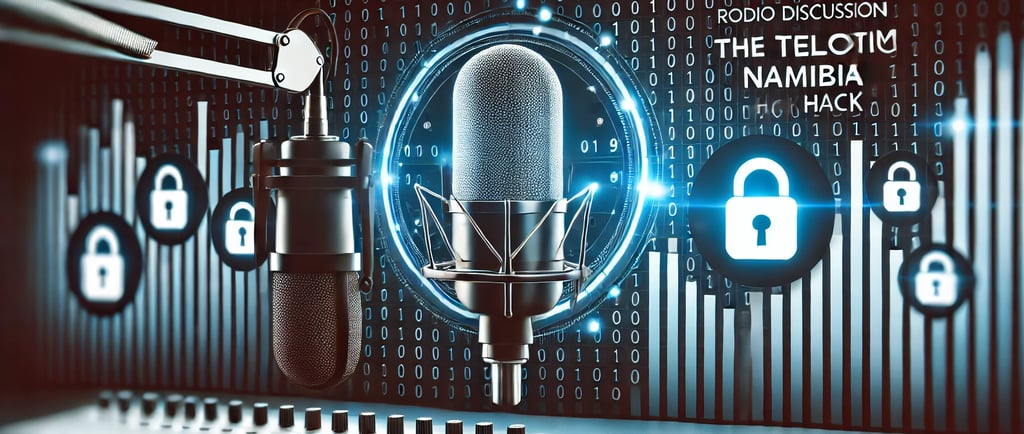Eagle FM interview on the Telecom Namibia hack
Insights from our Eagle FM interview on the Telecom Namibia hack and its cybersecurity implications for Namibia.
12/20/20244 min read


Introduction
At Meinert Cybersecurity, Namibia’s first dedicated cybersecurity awareness company, we help Namibian businesses—from SMEs to large enterprises—and individuals protect themselves against evolving cyber threats.
With 95% of cyberattacks succeeding due to human error, we provide cybersecurity awareness training that is specifically adapted to Namibia’s unique challenges.
Through practical learning, including interactive training, phishing simulations and workshops, we educate people to be the strongest line of defence.
Our mission is to educate and empower people, creating a safer digital environment across Namibia with solutions designed to meet the needs of our businesses and communities.
Questions and Answers
Namibia is currently battling with an increasingly challenging cybersecurity landscape, especially with the recent Telecom data loss incident. How will the surge in cybercrimes impact the country?
The recent surge in cybercrime has exposed vulnerabilities in Namibia’s digital systems, with far-reaching consequences:Financial Losses: Cyber breaches result in significant costs for businesses and individuals. Companies often fly in cybersecurity experts from abroad, working for weeks to restore systems. Globally, 60% of small businesses close within six months of a major cyberattack.
Reputational Damage: Incidents like this undermine trust in organisations and Namibia’s ability to ensure a secure digital environment.
Service Disruptions: When critical organisations like Telecom are affected, essential services are interrupted, causing economic delays and frustration. For instance, a tourism company hit by ransomware would be unable to take bookings for weeks.
Impact on Individuals: Data leaks can have severe personal consequences, such as identity theft. Leaked ID cards may be used to access bank accounts, take out loans, or open store accounts in someone’s name, creating long-term financial distress.
Namibia aims to have a smart, digitally connected future aligned with Vision 2030 aspirations. How can the country best achieve this considering the setbacks of cybercrimes it has faced?
To achieve Vision 2030, Namibia must balance innovation with security:Investing in Cybersecurity Awareness: 95% of cyberattacks involve human interaction, making people the weakest link—but also the strongest defence when properly trained. Educating employees and the public on phishing, smishing, and secure practices is critical. We all need to take responsibility to create a safer digital environment.
Building Robust Infrastructure: Organisations must secure their systems and conduct regular vulnerability testing to meet international standards.
Businesses Taking Immediate Action: Companies cannot wait for government policies or legislation. Cybercrime ranks as the fourth most significant risk for businesses in Namibia (Allianz Risk Barometer 2023). Proactive measures—like cybersecurity training and strengthening systems—are essential to protect their data and operations now.
Government Action: A clear cybersecurity strategy and enforceable legislation are needed to guide and prepare the country for cyber threats.
Does it erode trust in our digital systems?
Absolutely. When data breaches occur—especially at a national level—trust is one of the first casualties.Individuals lose confidence in organisations to protect their personal data, leading to fewer people using online platforms. This slows Namibia’s progress towards a digitally connected future.
Businesses hesitate to adopt new technologies, fearing financial losses and reputational damage from potential breaches.
International investors may perceive Namibia as a high-risk environment, impacting economic growth and opportunities.
Restoring trust requires transparency, accountability, and action. Organisations must:
Communicate openly about incidents,
Clearly outline how breaches are being addressed, and
Demonstrate steps to prevent future attacks.
Considering this was such a massive breach on the government's biggest telecom company, with people's details leaking, including ministers, what is the potential impact on the economy?
The economic impact of such breaches can be significant:Direct Financial Costs: Recovering from breaches is costly, involving investigations, compensating affected individuals, and securing compromised systems.
Loss of Investor Confidence: Frequent breaches can make Namibia appear risky to foreign investors and partners, as cybersecurity is a global priority.
Increased Fraud: Leaked personal data can lead to identity theft and fraud, causing financial and emotional harm to individuals.
Slower Digital Adoption: Fear of data breaches can discourage people from using digital services, delaying Namibia’s progress towards Vision 2030 and slowing economic growth.
Breaches like this emphasise the need for proactive cybersecurity measures. Businesses must view cybersecurity as an investment, not an expense, to protect both their operations and the economy. In the EU and US, businesses spend 2-5% of their annual revenue on cybersecurity, and this is a reality we need to come to terms with.
How does Namibia not having legislation yet in place to tackle cybersecurity affect its line of work?
The absence of formal cybersecurity laws creates significant challenges:Lack of Accountability: Without clear legal standards, many organisations fail to prioritise protecting customer data.
Delayed Response: Law enforcement lacks the tools to quickly respond to and prosecute cybercriminals.
Limited Awareness: Organisations often overlook cybersecurity training, leaving employees and individuals vulnerable to attacks.
Additional discussion topics
1. What actionable steps companies can take to protect themselves now
Companies need to act quickly to strengthen their cybersecurity. 95% of attacks involve human error, so awareness training is critical. Our experience shows that 20-30% of phishing emails in Namibia are fallen for, which poses an extremely high risk to businesses. Simple steps like educating staff to recognise phishing emails, running phishing simulations, and enforcing strong password policies can go a long way. Businesses should also ensure they have regular backups and test their systems for vulnerabilities. Cybersecurity isn’t just about technology—it’s about empowering employees to become the first line of defence.
2. What individuals can do to protect themselves after this breach
For individuals, protecting yourself starts with vigilance. Monitor your bank accounts and personal information closely, and be wary of suspicious SMS messages or emails. If your data has been leaked, change your passwords immediately, especially for sensitive accounts like banking or email. Avoid sharing personal information unless absolutely necessary, and be on the lookout for signs of identity theft, such as loans or accounts being opened in your name. Awareness is key—knowing the risks is the first step in staying safe.
3. Why Namibia is now a bigger target for cyberattacks
The Telecom breach has put Namibia on the radar for global hacker groups, as it signals that we are an easy target. Cybercriminals often follow patterns—when they see weaknesses, they strike repeatedly. This means businesses and individuals in Namibia need to be extra vigilant now. Companies cannot afford to ignore cybersecurity; proactive measures like awareness training and stronger defences are no longer optional. As a country, we must prove that we’re not an easy target by acting quickly to build a culture of security.


